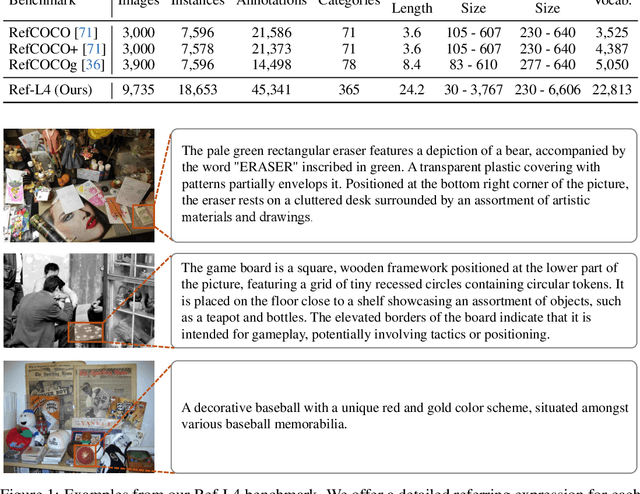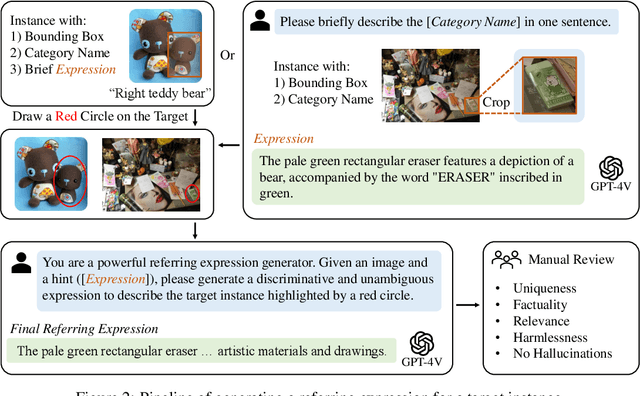Zhuoxuan Peng
Revisiting Referring Expression Comprehension Evaluation in the Era of Large Multimodal Models
Jun 24, 2024



Abstract:Referring expression comprehension (REC) involves localizing a target instance based on a textual description. Recent advancements in REC have been driven by large multimodal models (LMMs) like CogVLM, which achieved 92.44% accuracy on RefCOCO. However, this study questions whether existing benchmarks such as RefCOCO, RefCOCO+, and RefCOCOg, capture LMMs' comprehensive capabilities. We begin with a manual examination of these benchmarks, revealing high labeling error rates: 14% in RefCOCO, 24% in RefCOCO+, and 5% in RefCOCOg, which undermines the authenticity of evaluations. We address this by excluding problematic instances and reevaluating several LMMs capable of handling the REC task, showing significant accuracy improvements, thus highlighting the impact of benchmark noise. In response, we introduce Ref-L4, a comprehensive REC benchmark, specifically designed to evaluate modern REC models. Ref-L4 is distinguished by four key features: 1) a substantial sample size with 45,341 annotations; 2) a diverse range of object categories with 365 distinct types and varying instance scales from 30 to 3,767; 3) lengthy referring expressions averaging 24.2 words; and 4) an extensive vocabulary comprising 22,813 unique words. We evaluate a total of 24 large models on Ref-L4 and provide valuable insights. The cleaned versions of RefCOCO, RefCOCO+, and RefCOCOg, as well as our Ref-L4 benchmark and evaluation code, are available at https://github.com/JierunChen/Ref-L4.
Single Domain Generalization for Crowd Counting
Mar 14, 2024Abstract:Current image-based crowd counting widely employs density map regression due to its promising results. However, the method often suffers from severe performance degradation when tested on data from unseen scenarios. To address this so-called "domain shift" problem, we investigate single domain generalization (SDG) for crowd counting. The existing SDG approaches are mainly for classification and segmentation, and can hardly be extended to our case due to its regression nature and label ambiguity (i.e., ambiguous pixel-level ground truths). We propose MPCount, a novel SDG approach effective even for narrow source distribution. Reconstructing diverse features for density map regression with a single memory bank, MPCount retains only domain-invariant representations using a content error mask and attention consistency loss. It further introduces patch-wise classification as an auxiliary task to boost the robustness of density prediction to achieve highly accurate labels. Through extensive experiments on different datasets, MPCount is shown to significantly improve counting accuracy compared to the state of the art under diverse scenarios unobserved in the training data of narrow source distribution. Code is available at https://github.com/Shimmer93/MPCount.
 Add to Chrome
Add to Chrome Add to Firefox
Add to Firefox Add to Edge
Add to Edge